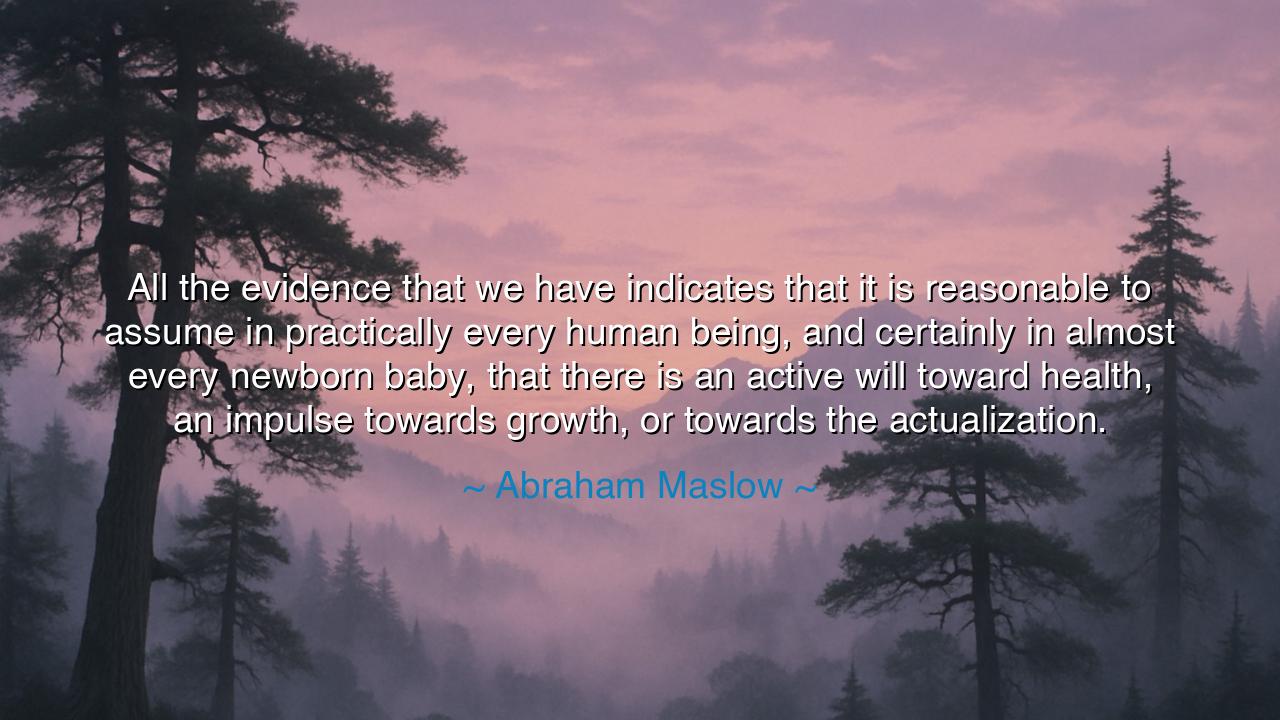
All the evidence that we have indicates that it is reasonable to
All the evidence that we have indicates that it is reasonable to assume in practically every human being, and certainly in almost every newborn baby, that there is an active will toward health, an impulse towards growth, or towards the actualization.






In the grand tapestry of human thought, few voices have spoken with such radiant faith in the human spirit as Abraham Maslow, the great psychologist and philosopher of the soul’s ascent. When he declared, “All the evidence that we have indicates that it is reasonable to assume in practically every human being, and certainly in almost every newborn baby, that there is an active will toward health, an impulse toward growth, or toward the actualization,” he did not speak as a mere scientist, but as a seer who had gazed upon the inner architecture of life itself. His words are both observation and prophecy — a declaration that within every human heart burns a sacred impulse toward growth, a striving not merely to survive, but to become.
Maslow lived and wrote in a century marked by destruction — by wars that tore nations apart, by ideologies that sought to crush the soul beneath machinery and power. Yet even amidst that darkness, he perceived a truth more enduring than despair: that human beings, like the seed breaking through the soil, are driven by a hidden will toward health, toward wholeness, toward the actualization of what they were born to be. He looked upon the newborn — helpless yet radiant with possibility — and saw not fragility, but promise. He understood that from our first breath, there is within us a divine restlessness, a desire to grow, to learn, to love, to unfold toward the light of our fullest being.
This vision lies at the heart of what Maslow called self-actualization, the pinnacle of his hierarchy of needs — the flowering of the human soul once safety and belonging are secured. To actualize oneself is not to reach perfection, but to become what one truly is, as the acorn becomes the oak. It is the unfolding of potential, the realization of essence. Every act of creation, every moment of courage, every quiet decision to heal rather than to harden is an expression of that same impulse toward growth. Even when we stumble, even when suffering seems to devour us, that impulse remains — like a fire beneath the ashes, waiting to rise again when the winds of will return.
Consider the life of Helen Keller, who was struck blind and deaf at the age of two. Her world was silent and dark, yet within her burned the same will toward growth that Maslow spoke of. When the young teacher Anne Sullivan placed a hand into hers and spelled “water,” something miraculous awoke — not merely understanding, but the awakening of the self. Deprived of sight and sound, Helen reached toward knowledge, language, and life itself. She became a writer, an advocate, a philosopher of hope. In her, we see Maslow’s truth made flesh: that no deprivation can extinguish the innate flame of actualization within the human spirit.
But Maslow’s teaching carries both beauty and challenge. For though the impulse toward health exists in all, it can be suppressed — buried beneath fear, oppression, or the false comforts of mediocrity. The world often teaches us to conform, to quiet our longings, to shrink rather than expand. Yet those who deny the call to grow betray the very principle of their existence. To live without striving toward one’s potential is to live half-awake, to walk as a shadow of what might have been. The wise, therefore, must nurture the conditions in which the will to grow can thrive — through honesty, love, freedom, and the courage to fail and rise again.
Maslow believed that humanity’s future — its art, its science, its morality — depended on honoring this inner force. When people are allowed to grow naturally, when they are free from fear and shame, they do not descend into chaos; they rise into creativity, compassion, and purpose. This, he taught, is our nature — not to destroy, but to build; not to decay, but to evolve. It is the sacred rhythm of life itself, echoing from the newborn’s cry to the philosopher’s final sigh: the call to become fully human.
So, O seeker of truth, let this teaching take root in your heart: that you were not made for stagnation or despair, but for growth. Within you burns the same ancient impulse that drives the flower to bloom and the star to shine. When you feel lost, remember that the will toward health is already within you, quietly guiding you toward balance, healing, and fulfillment. Feed it with honesty, nourish it with learning, strengthen it with love. And when the world would tell you to remain small, answer it with the silent power of your becoming.
For the wisdom of Abraham Maslow is this: that to be alive is to strive upward. The universe itself is a story of actualization — of atoms becoming stars, of life becoming consciousness, of man becoming aware of his own greatness. You, too, are part of that eternal ascent. Trust the impulse within you. Grow. Actualize. And let your becoming be your greatest act of gratitude to the life that gave you breath.






AAdministratorAdministrator
Welcome, honored guests. Please leave a comment, we will respond soon